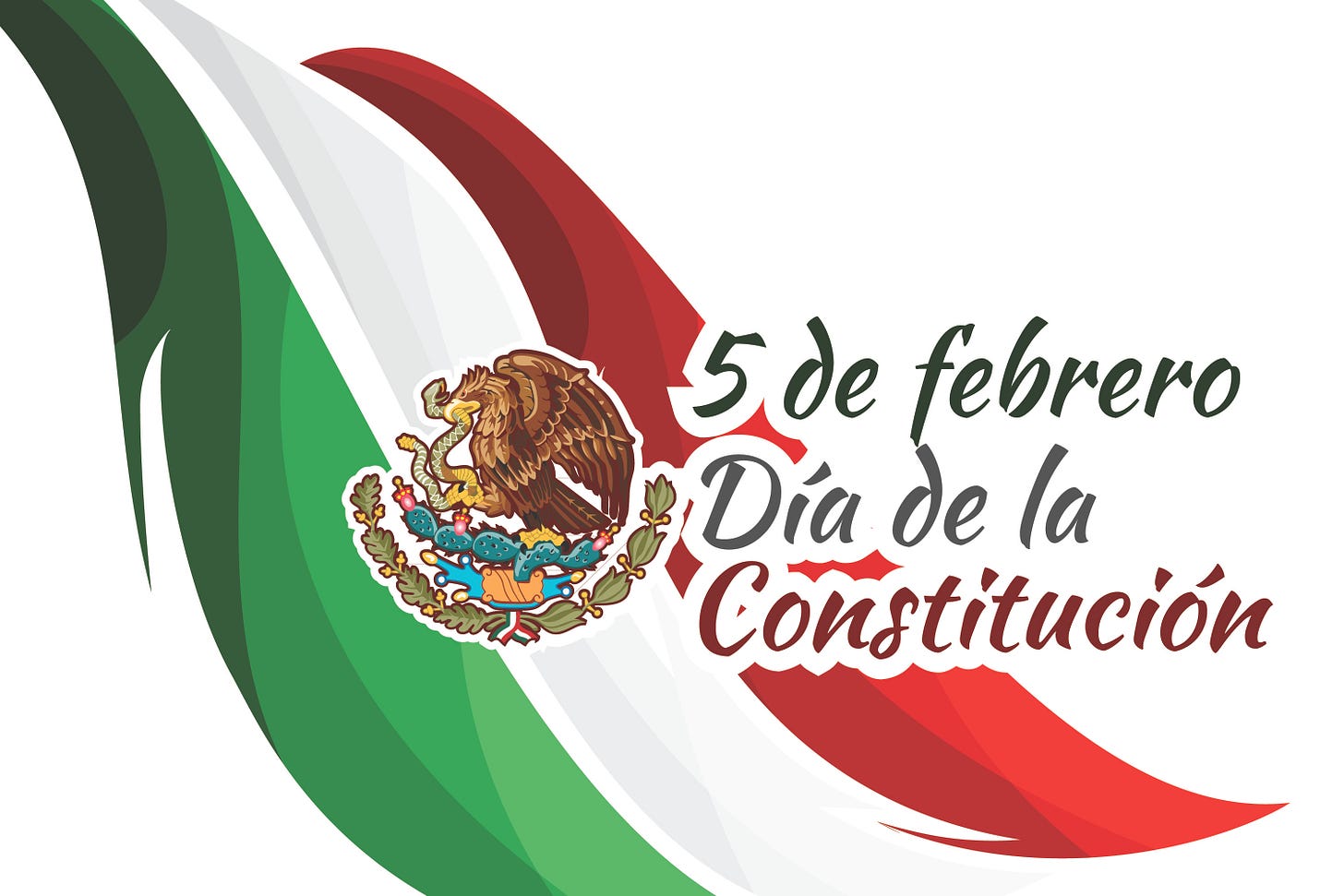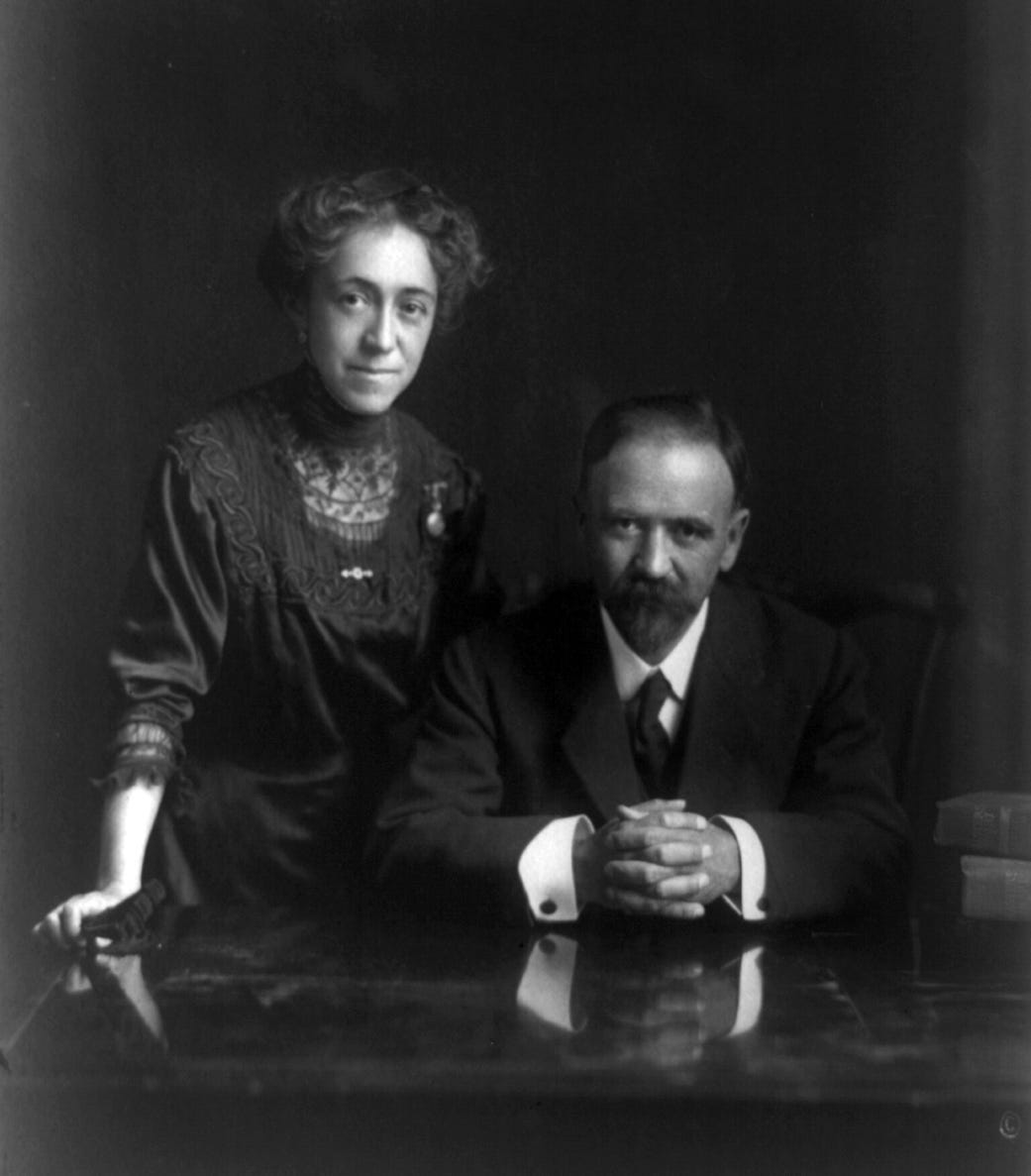¡Feliz Día de la Constitución!
Enjoy the day off (if you're in Mexico (and you get the day off))
Today, February 6, 2023, is the celebration of Constitution Day in Mexico. While the modern Constitution of Mexico was promulgated on February 5, 1917, the public holiday is defined as the first Monday of February, which means that Mexican workers can enjoy a long weekend.
Día de la Constitución is one of 7 statutory holidays in Mexico1. On statutory holidays, workers in Mexico are given full pay if they have the day off, or triple pay if they must work that day for any reason. Schools are also closed.
The Constitution of Mexico is a remarkable document. It codified some of the foundational elements of liberal and progressive governments well before similar documents of most other nations. Diving deeply into the constitution itself, and the historical events that led to its inception, would require a book-length exploration. Fortunately for you, I am lazy, so I will skim the surface here by calling out just a few interesting facts related to this quite literally groundbreaking document.
How The Constitution of Mexico Came Into Being
The Constitution of Mexico was authored and promulgated as a direct result of the Mexican Revolution, a struggle which began in 1910 and lasted until about 1920. The Mexican Revolution was largely a response - led by Francisco I. Madero, Pancho Villa, Pascual Orozco and others - to the effective dictatorship of Porfirio Diaz, who ruled as President cum dictator of Mexico for over 30 years.
Francisco Madero is a fascinating figure in Mexican history, worthy of a future article devoted entirely to him. Madero - although born to one of Mexico's wealthiest families - was a true and unwavering believer in democracy, liberalism and social justice, especially as these related to the working classes and peasants of Mexico. A revolutionary in spirit, if not a warrior in action, Madero was able to rally to his cause leaders, armies, and even the United States of America. The revolutionary forces soon succeeded in forcing President Porfirio Diaz to resign2. Soon (but not immediately) after Diaz' resignation, Madero became the 37th president of Mexico, in 1911. Tragically, his presidency was ultimately disastrous (Madero was many things, but not a politician) and he was ousted and assassinated in a coup d'etat in 1913. Today Madero rightly remains a venerated figure from Mexico's history.
The constitution itself was drafted by a group convoked by Venustiano Carranza, another revolutionary and contemporary of Madero's, in the city of Querétaro in the state of Querétaro. Carranza would eventually become the 44th President of Mexico - but his alliances and beliefs were a bit more fluid than those of Madero's, and he allowed power to go to his head. Carranza's presidency ended with a fate similar to Madero's.
Social Rights
The Constitution of Mexico is recognized as the first constitution in the world to codify social rights into law. Some of these social rights include:
Access for all to a free and mandatory secular eduction.
A series of land reforms, effectively revoking the ownership of large swaths of land by the Catholic Church, corporations and other landed elites, and bringing into being the modern ejido system of communal land ownership, which is meant to benefit Mexico's indigenous communities.
The land reforms also established the prohibition of foreign property ownership near borders and along the coast; this prohibition is why foreigners today who buy property in these areas must hold the title in a fideicomiso (effectively, a bank trust).
The right to work. Article 123 of Title 6 of the Constitution rather amazingly states that:
"Toda persona tiene derecho al trabajo digno y socialmente útil; al efecto, se promoverán la creación de empleos y la organización social de trabajo, conforme a la ley"
or (translation courtesy of Universidad Nacional Autónoma de México):
"Every person has the right to have a decent and socially useful job. Therefore, job creation and social organization of work shall be encouraged according to the law."
Other workers rights defined by the constitution include:
The right to strike
A minimum wage
An 8-hour workday (with various exceptions)
Presidential Term Limit
The 1917 constitution limited the office of the president to just one 6-year term. The framers of the constitution did not want to entertain the possibility of another Porfirio Diaz-like regime in Mexico.
Amendments
The Constitution of Mexico has been amended many times over the years. Some notable amendments include:
The repeal of most of the restrictions on the Catholic Church 🤷♂️.
The allowance for a second term for the presidency of Mexico, so long as the second term is non-consecutive with the first.
Complete ban on the use of capital punishment.
Constitutionally guaranteed right to sufficient food for the "physical, emotional and intellectual development" of every person in Mexico.
Imperfections
The constitution is ultimately a document whose interpretation and execution are both flawed and open to interpretation. The various labor laws defined by the constitution do not in the end address the real fact that many workers in Mexico do not earn a living wage. And the constitutionally-guaranteed right to food does not mean that many people in Mexico still do not have access to enough or the right kinds of nutrition. While the constitution itself is a shining model, it is an ideal whose realization is in the hands of we flawed humans; corruption, inattention and personal interests unfortunately sometimes supersede the lofty ambitions of the document itself.
Cue Fireworks
Despite flaws in execution and interpretation, the Constitution of Mexico was and remains one of the most progressive state documents in existence. The cultural and historical tides of Mexico had converged in 1917 to produce for both Mexico and the world at large one of the most remarkable trophies in the triumph of liberal ideals over tyrannical and authoritarian conventions. Mexico's constitution is a testament to the struggle for freedom, equality and equity, well worthy of celebration.
The others are: New Year's Day (Jan. 1), Benito Juárez's Birthday (March 21), Labor Day (May 1), Independence Day (Sept. 16), Revolution Day (Nov. 20), Christmas Day (Dec. 25). Federal and local election days are also statutory holidays.
Diaz fled to Spain, and lived his remaining days in exile in Paris, a city he loved and used as a model during his long presidency for many of his urban projects in Mexico City.





I, too, could write volumes on my heart and gut reactions to the information you have presented. I feel a mix of sadness, Mexico - its leaders and citizens - are not living up to such ideals as posed by La Constitución and hopefulness there is a roadmap to walk into a better future for humankind. As a person with dual citizenship - Mexican and North-American, I will proceed to take the day off.
Thanks Mike, super informative and now I know a lot more about the people for whom many streets in Mexico are named!